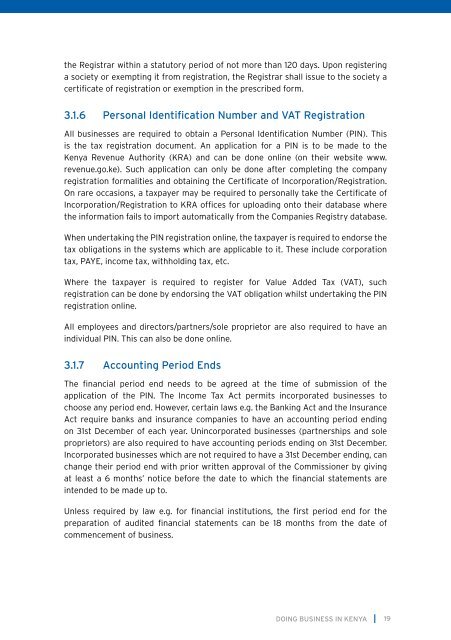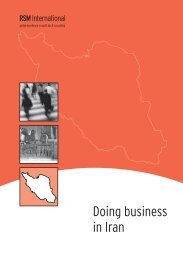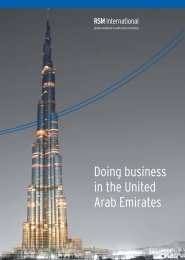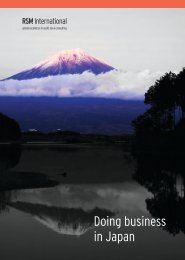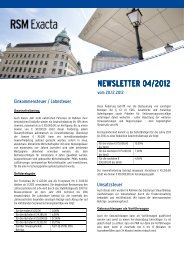Doing Business in Kenya - RSM International
Doing Business in Kenya - RSM International
Doing Business in Kenya - RSM International
- No tags were found...
You also want an ePaper? Increase the reach of your titles
YUMPU automatically turns print PDFs into web optimized ePapers that Google loves.
the Registrar with<strong>in</strong> a statutory period of not more than 120 days. Upon register<strong>in</strong>ga society or exempt<strong>in</strong>g it from registration, the Registrar shall issue to the society acertificate of registration or exemption <strong>in</strong> the prescribed form.3.1.6 Personal Identification Number and VAT RegistrationAll bus<strong>in</strong>esses are required to obta<strong>in</strong> a Personal Identification Number (PIN). Thisis the tax registration document. An application for a PIN is to be made to the<strong>Kenya</strong> Revenue Authority (KRA) and can be done onl<strong>in</strong>e (on their website www.revenue.go.ke). Such application can only be done after complet<strong>in</strong>g the companyregistration formalities and obta<strong>in</strong><strong>in</strong>g the Certificate of Incorporation/Registration.On rare occasions, a taxpayer may be required to personally take the Certificate ofIncorporation/Registration to KRA offices for upload<strong>in</strong>g onto their database wherethe <strong>in</strong>formation fails to import automatically from the Companies Registry database.When undertak<strong>in</strong>g the PIN registration onl<strong>in</strong>e, the taxpayer is required to endorse thetax obligations <strong>in</strong> the systems which are applicable to it. These <strong>in</strong>clude corporationtax, PAYE, <strong>in</strong>come tax, withhold<strong>in</strong>g tax, etc.Where the taxpayer is required to register for Value Added Tax (VAT), suchregistration can be done by endors<strong>in</strong>g the VAT obligation whilst undertak<strong>in</strong>g the PINregistration onl<strong>in</strong>e.All employees and directors/partners/sole proprietor are also required to have an<strong>in</strong>dividual PIN. This can also be done onl<strong>in</strong>e.3.1.7 Account<strong>in</strong>g Period EndsThe f<strong>in</strong>ancial period end needs to be agreed at the time of submission of theapplication of the PIN. The Income Tax Act permits <strong>in</strong>corporated bus<strong>in</strong>esses tochoose any period end. However, certa<strong>in</strong> laws e.g. the Bank<strong>in</strong>g Act and the InsuranceAct require banks and <strong>in</strong>surance companies to have an account<strong>in</strong>g period end<strong>in</strong>gon 31st December of each year. Un<strong>in</strong>corporated bus<strong>in</strong>esses (partnerships and soleproprietors) are also required to have account<strong>in</strong>g periods end<strong>in</strong>g on 31st December.Incorporated bus<strong>in</strong>esses which are not required to have a 31st December end<strong>in</strong>g, canchange their period end with prior written approval of the Commissioner by giv<strong>in</strong>gat least a 6 months’ notice before the date to which the f<strong>in</strong>ancial statements are<strong>in</strong>tended to be made up to.Unless required by law e.g. for f<strong>in</strong>ancial <strong>in</strong>stitutions, the first period end for thepreparation of audited f<strong>in</strong>ancial statements can be 18 months from the date ofcommencement of bus<strong>in</strong>ess.DOING BUSINESS IN KENYA19


